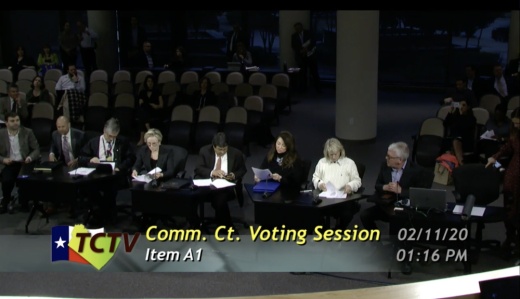The key proposals include identifying certain nonviolent offenses and criteria for which defendants could be preapproved for release on a personal bond, which requires no payment except an administrative fee, and exploring the possibility of providing representation at magistration.
“This is not replacing what we have currently,” County Court-at-Law Judge Elisabeth Earle told commissioners. “It’s adding to it.”
The precedent
In December, Harris County instituted historic bail reforms, granting personal bonds to most misdemeanor arrestees and requiring the pretrial release of all misdemeanor arrestees, excluding those accused of offenses such as domestic violence or assault.The reforms resulted from a landmark settlement.
In 2016, three people charged with misdemeanors—which include crimes such as drug possession, theft and driving while intoxicated—filed a lawsuit against Harris County, alleging it unfairly jailed misdemeanor defendants who could not afford bail. In 2017, a federal judge declared the county’s bail system unconstitutional.
The local system
When someone is arrested in Travis County, he or she is booked at the local jail and screened by staff to determine if he or she is eligible for release on a personal bond and a court-appointed attorney.A personal bond is a sworn agreement by a defendant that he or she will return to court as ordered. It does not require a payment except for an administrative fee.
If recommended for a personal bond, he or she then goes before a judge, whose approval is required for release. This is called a magistration hearing, and in Travis County attorneys are not present.
“The first time they stand in front of a judge; they are standing there alone,” said Geoffrey Burkhart, executive director of the Texas Indigent Defense Commission. “They don’t have an attorney counseling them on this, and this is an important moment where probable cause is being determined, where bail is being determined.”
Possible changes
The recommendations followed the issuance of a standing order by Travis County’s seven court-at-law judges, who oversee misdemeanor criminal cases, on Feb. 6. The order lays out a plan to expand the use of personal bonds for defendants who meet certain criteria.County Attorney David Escamilla told commissioners that the work group and the county court-at-law judges “have taken the extraordinary step to move forward with a standing order providing for an automatic bond process to be added in conjunction with our already very wonderful personal bond system."
In 2018, 60% of misdemeanor defendants eligible for release on a personal bond received one, according to an earlier presentation made by the work group.
Serious consequences can result for those denied a personal bond. If they cannot afford bail, they remain in jail, which can lead to a lost job or the removal of one’s children by Child Protective Services.
“The longer a person is in jail, the worse your outcomes are going to be,” said Bradley Hargis, deputy director of the Capital Area Private Defender Service, which assigns private counsel to clients who quality for a court-appointed attorneys.
The work group in Travis County also recommended identifying a list of nonviolent felony offenses for which defendants could be preapproved for release on a personal bond.
“I’m hopeful,” District Attorney Margaret Moore said of achieving this within the current budget cycle, which ends Sept. 30.
Expanding the use of personal bonds could create cost savings and other benefits for the county by reducing the number of people in jail and the length of time they spend incarcerated.
“It saves the jail to handle the people they need to focus on,” Earle said.
What’s ahead
While commissioners expressed their personal support for the recommendations, County Judge Sarah Eckhardt stressed the added costs of providing representation at magistration.“We need to have a sharp pencil and figure how much it would cost under a 3.5[% property tax] revenue cap,” Eckhardt said. “It’s going to be a large number. This kind of pilot would be important to us so that we would know what kind of offsetting benefits there are both in human benefit and in financial benefit because it will be a big number.”
Additionally, criminal justice reform advocates raised concerns about the standing order and expressed hope that a second version might be issued that follows the precedent set by Harris County, in which defendants preapproved for release on a personal bond can bypass the magistration process altogether.
“I think this is a place where Travis County can show up Harris County,” said Amanda Woog, executive director of the Texas Fair Defense Project.




